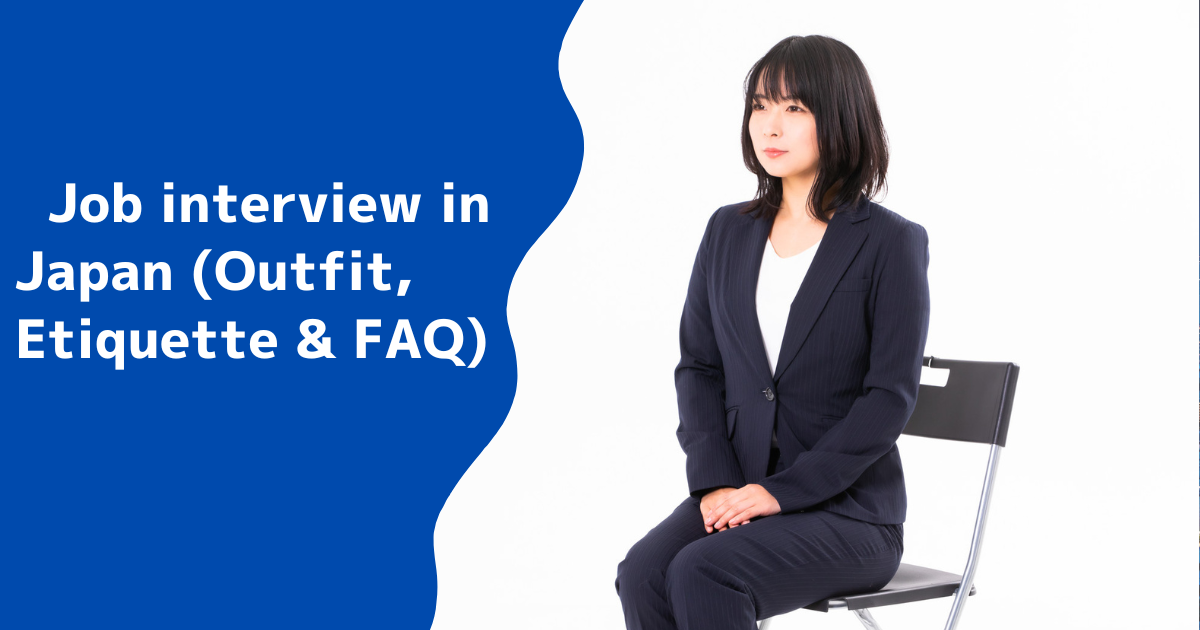If you planning to apply for a job in Japan, you might wonder a lot of things such as the following.
-What is the characteristic of Japanese interview
-What kind of outfit should be appropriate?
-What is the etiquette of Japanese interview?
-What kind of questions are frequently asked by interviewers?
If you don’t know anything about the above matters and just follow your country’s way, unfortunately, you cannot pass any Japanese interview or even be ashamed regardless of how competent the applicant is for the job.
In this article, I’d like to share the following matters regarding Japanese job interviews.
-Characteristics of Japanese job interview
-Appropriate outfit to wear
-Etiquette of waiting, entering an interviewing room, greeting, leaving
-Frequently Asked Questions during the interview
After reading this explanation I hope you will understand the overall Japanese interview and make a good impression on interviewers and successfully enter a desired company.

Let me introduce about myself.
I am Hiro from Tokyo, Japan, born and raised here.
I have working experience in Japanese companies (logistics and manufacturing) as an international sales for almost 10 years, so I well understand Japanese work culture including job interviews because I swapped companies twice and had the interview around 100 times.
Characteristics of Japanese job interview

Distinctive Japanese culture is well reflected in a Job interview in Japan and the way the interview is totally different from Western countries or even other Asian countries. For example, there is an outfit preference for an interview, politeness (greetings, bowing, etc.) is considered to be important and potential or teamwork skill is more emphasized than personal skill when choosing candidates.
Appropriate outfit to wear
There is a certain color suit that is suited for job interviews in Japan.
Man

Suit: A blackish suit. Both jacket and bottom are the same color, and you need to prepare a jacket to wear during the interview even in the hot summer.
Shirt: White color shirt
Tie: The tie must be worn. (You should avoid black color because it associates funerals in Japan)
Sox: Solid black or gray
Shoes & belt: black or brown (the color of shoes and belt should be synchronized)
Woman

Jacket: a blackish Jacket
Bottom: suit trousers or a skirt (the same color as the jacket is better) if you wear a skirt long skirt enough to hide your knees is better.
Shirt: white blouse a cut-and-sew T-shirt
Hairstyle: tieing hair if it’s long
Shoes: Pumps
Those uniforms are suited especially for job hunting for students (Japanese high school or university students normally start to job hunt in their final year). When a job changes you could be more casual wearing a suit, but if you don’t know how to casually wear it, the above-explained example for a man or woman is much safer even if it is a job change interview.

Japanese people are really strict about job interview outfits.
Etiquette of job interview

There are a lot of etiquettes to follow when you attend job interview. It’s really difficult to remember all of the etiquette, so I recommend you practice several times after reading the following steps.
Waiting at a company reception

You should arrive at interviewing company’s reception around 5 minutes before the interview starts.
You inform your school name (if you are student), your name, and purpose of visit (interview) to the receptionist and have a seat quietly.
The attitude while waiting can also be important to make first good impression.
Entering interviewing room

Slowly knock the interviewing room door and if interviewer says “Please come in (douzo どうぞ)”, you open the door, enter and close the door gently.
After closing the door, you say “Excuse me (shitsurei itashimasu 失礼いたします) to the interviewers and bow.
Then you walk near your seat and tell your name and say nice to meet you (yoroshiku onegai itashimasu よろしくお願い致します) and bow again.
After the interviewer say “Have a seat (Osuwari kudasai お座りください), you can sit gently saying “Excuse me (shitsurei itashimasu 失礼いたします).
Leaving interviewing room
After the interview is finished, you say “Thank you for your time today (Honjitsu ha Arigatou gozaimashita本日はありがとうございました) and deeply bow.
Then stand up and say thank you (arigato gozaimashitaありがとうございました) again and walk to near the door and look back at the interviewer and say “Excuse me (shitsurei itashimasu 失礼いたします) and open the door, leave and close the door gently.
Again the procedure of the interview is really hard to remember, so you may make a mistake and it is still no problem but sincerity is the most important when following the above steps.
I did interviews several years ago, I often forgot to say a certain words or forgot next step when entering the room or bowing, etc. but I politely did everything and the interviewer didn’t care about my mistake. (What you communicate during the interview is the most critical )
Frequently asked questions during the interview.

Japanese companies relatively check the potential of candidates more than their own skills because Japanese companies tend to spend more time educating new workers, not letting them work in a designated position immediately.
Also, Japanese companies see candidates’ attitudes toward working as a team (not much of their personal skills) and their communication abilities with other workers.
When considering expected answers, you may tell your characteristic or your tendency towards your work and may tell how you worked in a team and achieved a goal if you have any.
Of course you can tell your personal achievement if you have though.
I personally had experience changing jobs twice and had job interviews with around 100 companies in Japan.
Based on my experience, I’d like to share frequently ask questions.
Please introduce yourself (自己紹介をして頂けますか)
Most companies ask you to introduce yourself first of all.
You should summarize 30 seconds to 1 minute to tell your name, brief profile, academic background, and work experience ( if no experience of work, you may tell experience of part time job or club activities)
If the introduction is longer than that interviewers may feel tired, so please practice finishing it within 1 minute.
Please tell your strength and weakness.(あなたの強みと弱みを教えてください)
If your interviewer asks about your strength, you may tell the positive side of yourself in one sentence and the reason for your strength. Also you may tell how that strength can be useful to the applying company.
If your interviewer asks about your weakness, you need to tell objectively what your negative part is and also tell how you try to overcome the weakness.
Example of telling strength:
My strength is having tenacious vitality.
I am a sales person in logistics company and did 10-20 new sales call a day since last year and as a result,
I received 3-4 new orders monthly and I was chosen to be number one sales in my sales department.
I will keep doing sales activity tenaciously in your company.

That sentence is what I actually told during my interviews several years ago.
Could you tell us the reason of changing jobs?(転職理由を教えてください)

The question is always asked if you are currently working in another company.
Of course, there could be a lot of criticizing matters regarding your current company, but please don’t obviously criticize or blame the working environments because the interviewer guesses the candidate could have the same criticism regarding a newly entering company as well and the interviewer possibly won’t have a good impression of you.
What the interviewer wishes to know is what the candidates desire after entering the new company, so you should rather say what you want to accomplish after entering the interviewed company.
Example answer:
I wish to have a more international environment. Your company focuses on the overseas market more than my current company and your company’s overseas sales are more than domestic sales after entering your company I am confident I can be more aggressive to do business with overseas business partners in your company.

That’s exactly what I answered in my job interview several years ago.
Could you tell me the reason of applying our company?(志望動機を教えてください)
The question is one of the most asked questions in all job interviews.
The interviewer wishes to know the following matters through this question.
-How serious is the candidate’s wish to apply
-Is the candidate really suited for the job
-Is his/her way of thinking suited to our company’s philosophy
You really need to fully study applying company through the company website or news and tell what exact part attracts you about the company.
Furthermore, you can tell how your experience matches this company’s job.
Example of answer:
I am attracted to your company’s products because the products contribute to power plants in Japan and all over the world and the market share is number one in Japan and the overseas sales ratio is more than 50 %.
I wish to be a part of your team to sell your worldly used products more and more based on my experience of sales for 3 years.

That’s what I answered during a job interview several years ago when applying manufacturing company of industrial parts.
Is there any question regarding our company?(逆に何か当社について聞きたいことはありますか)
Almost all companies give you opportunity to ask questions.
What the interviewer want to know is how much the candidate research about the applying company and please consider it is good chance to tell your passion to work in that company.
You should never ask questions which you can find answers through company website easily.
I suggest you read all the information on the company website over and over again in advance and also the company’s related news or other websites to deeply research the company and come up with at least 3 questions regarding the company.
I often prepared more than 3 deeply researched questions about applying company and the interviewer often had a good impression of me and passed some interviews.
Conclusion
In this article, I explained Japanese job interview and you may now understand how distinctive Japanese job interviews are.
Now you know how to countermeasure for a job interview and I hope you will have successful work life in Japan.
Thank you for reading my article till the end.



コメント Comment